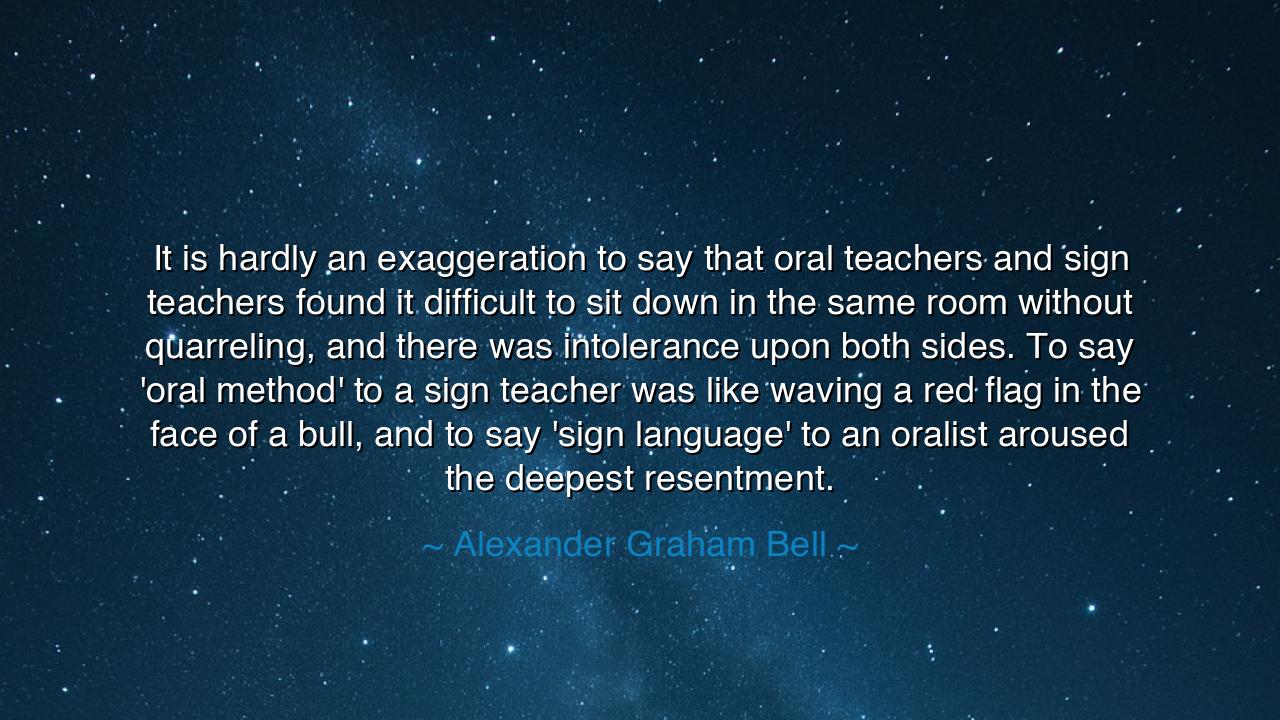
It is hardly an exaggeration to say that oral teachers and sign
It is hardly an exaggeration to say that oral teachers and sign teachers found it difficult to sit down in the same room without quarreling, and there was intolerance upon both sides. To say 'oral method' to a sign teacher was like waving a red flag in the face of a bull, and to say 'sign language' to an oralist aroused the deepest resentment.






Hearken, O seekers of wisdom and chroniclers of human endeavor, to the words of Alexander Graham Bell, who observed: “It is hardly an exaggeration to say that oral teachers and sign teachers found it difficult to sit down in the same room without quarreling, and there was intolerance upon both sides. To say 'oral method' to a sign teacher was like waving a red flag in the face of a bull, and to say 'sign language' to an oralist aroused the deepest resentment.” In these words lies a meditation on the power of conviction, the dangers of rigid ideology, and the human struggle to reconcile differing truths. The ancients understood that in any field of learning or governance, the clash of strongly held beliefs can both illuminate and divide.
Bell’s reflection captures the intensity of educational philosophy, where method and principle are intertwined with identity and moral purpose. The oral method, emphasizing speech and lip-reading, and the sign method, emphasizing manual communication, were not merely techniques—they were visions of what it meant to educate, empower, and transform. Each side perceived the other not as a colleague, but as a challenge to the very essence of their mission. The ancients recognized similar tensions: debates among philosophers, statesmen, and teachers often erupted when principle collided with practice.
The metaphor of the red flag in the face of a bull conveys the depth of passion and resistance on both sides. Words, methods, and ideologies were not neutral; they were extensions of conviction and identity. Bell observes that the slightest reference to the opposing method aroused resentment and defensiveness, revealing how strongly humans protect the frameworks through which they interpret the world. The ancients often warned that wisdom requires both conviction and temperance, lest zeal become destructive rather than constructive.
Consider the historical context of this divide. In the 19th century, debates over the education of the deaf were intense, with profound consequences for generations of students. The oralists believed in integration and the primacy of spoken language, while the sign teachers believed in the richness and accessibility of visual language. Both sought the flourishing of the child, yet intolerance and rigid adherence to ideology often overshadowed dialogue, collaboration, and shared goals. Bell’s reflection is both a record and a warning of the perils of uncompromising division.
Historical parallels illuminate this truth. Consider the rivalry between Plato and the Sophists in ancient Greece. Each group taught students, each valued their method and insight, yet their quarrels were fueled by the belief that to compromise would dilute truth. Like the oralists and sign teachers, their debates were not mere disagreement—they were struggles over the proper path to knowledge and virtue. Bell’s words echo this ancient lesson: zeal must be balanced with dialogue and respect to avoid harm.
The lesson here is profound: in the pursuit of education, knowledge, or moral guidance, passion and principle must be tempered with tolerance and understanding. To insist on one method at the expense of dialogue fosters resentment and conflict, and ultimately impedes the very goals educators seek to achieve. Bell’s reflection warns us that progress emerges not from dominance but from careful listening, mutual respect, and shared commitment to human flourishing.
Practical guidance flows naturally from this meditation. In your own life, whether teaching, leading, or collaborating, recognize the power of differing perspectives. Seek to understand rather than simply to persuade. Honor conviction, but cultivate tolerance. Engage in dialogue where quarrels might arise, and remember that shared purpose often lies beneath apparent opposition.
Thus, O seeker, engrave this wisdom upon your spirit: the path of teaching and learning is fraught with passion, pride, and division. Alexander Graham Bell’s words remind us that the strength of principle must be balanced by humility, tolerance, and dialogue. Only through such balance can differences illuminate truth, enrich practice, and ensure that education—like the human spirit itself—flourishes beyond the confines of quarrel and resentment.






AAdministratorAdministrator
Welcome, honored guests. Please leave a comment, we will respond soon